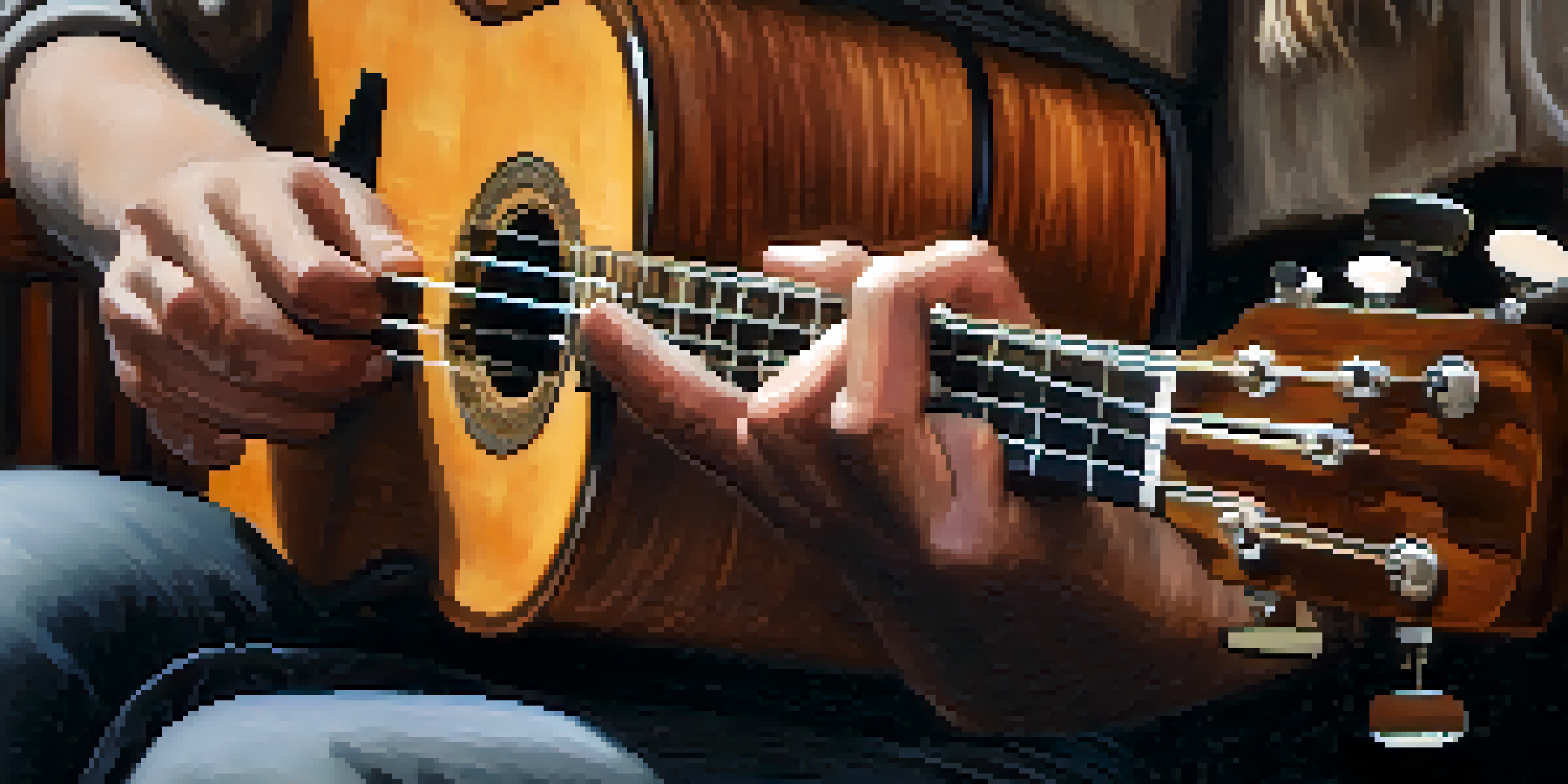The Role of Ukuleles in High School Music Education Programs

Introduction to Ukuleles in Music Education
The ukulele, a small and approachable string instrument, has found its way into high school music education programs across the globe. Its light weight and cheerful sound make it an appealing choice for students of all ages. By introducing the ukulele early in music education, students can build a strong foundation in musical skills while enjoying the learning process.
The ukulele is a perfect instrument for beginners, allowing them to experience the joy of making music without the intimidation of larger instruments.
Unlike larger instruments like the guitar or violin, the ukulele is relatively easy to pick up, making it perfect for beginners. Its four nylon strings are gentle on the fingers, encouraging students to practice without discomfort. This accessibility helps demystify music for students who may feel intimidated by more complex instruments.
Moreover, the ukulele’s versatility allows it to fit into various musical genres, from pop to folk to classical. This broad appeal can engage students who may have diverse musical interests, fostering a love for music that can last a lifetime.
Benefits of Playing the Ukulele in Schools
Playing the ukulele offers numerous educational benefits, particularly in developing fine motor skills and hand-eye coordination. As students learn to strum and fret the strings, they enhance their dexterity, which can translate to improved performance on other instruments. This skill development is essential as it lays the groundwork for more advanced musical techniques.

Additionally, the ukulele aids in teaching important musical concepts such as rhythm, melody, and harmony. Students can easily learn chord progressions and strumming patterns, allowing them to play along with their favorite songs. This immediate gratification can boost their confidence and encourage them to explore music further.
Ukuleles Enhance Music Education
The ukulele's accessibility and cheerful sound make it an ideal instrument for high school music programs, allowing students to build foundational musical skills while enjoying the process.
Socially, group ukulele classes foster teamwork and collaboration among students. Playing together encourages communication and listening skills, as they learn to sync their playing with others. This camaraderie can create a supportive environment where students feel comfortable expressing themselves musically.
Engagement and Motivation through Ukulele
One of the most significant advantages of incorporating ukuleles into high school music programs is the heightened engagement it brings to students. The instrument's fun and upbeat nature attracts students who might otherwise shy away from traditional music classes. When students are excited about what they are learning, they are more likely to participate actively.
Music education is not just about learning notes and rhythms, but about fostering creativity, collaboration, and a lifelong love for music.
Moreover, the ability to play popular songs on the ukulele can serve as a powerful motivator. Students often feel a sense of accomplishment when they can strum along to their favorite tracks, making practice enjoyable rather than a chore. This positive reinforcement can lead to increased practice time and a deeper connection to music.
Incorporating contemporary music into lessons encourages students to explore their musical tastes and preferences. This relevance to their everyday lives helps bridge the gap between formal education and personal interests, making learning more meaningful.
Versatility of the Ukulele in Music Genres
The ukulele's ability to adapt to various music genres is one of its most appealing features. From Hawaiian melodies to pop anthems, students can explore a diverse range of musical styles. This versatility not only keeps lessons fresh and exciting but also allows students to understand music theory in a broader context.
Teachers can design lessons that introduce students to different genres, fostering an appreciation for music's diversity. For instance, students might learn traditional Hawaiian songs, then transition to contemporary pop or even classical arrangements. This exposure can help students develop their unique musical identities.
Benefits of Group Learning
Playing ukuleles in group settings fosters teamwork and collaboration, enhancing communication skills and creating a supportive musical environment.
Additionally, the ukulele can be used as a tool for songwriting and composition. As students experiment with different chords and progressions across genres, they can create their own musical pieces, further enhancing their creativity and self-expression.
Accessibility and Affordability of Ukuleles
Another reason for the ukulele's increasing popularity in high school music programs is its affordability. Compared to other instruments, ukuleles are relatively inexpensive, making them accessible for schools with limited budgets. This affordability allows schools to equip their music programs without breaking the bank.
Furthermore, this accessibility extends to students who might not have the means to purchase their own instruments. Many schools can provide ukuleles for students to use during class, ensuring that everyone has the opportunity to participate. This inclusivity fosters a sense of community and encourages more students to join the music program.
The lightweight nature of the ukulele also makes it easy for students to transport, allowing for practice at home or even in other settings, such as during lunch breaks or after school. This convenience encourages consistent practice, which is vital for skill development.
Teaching Strategies with Ukuleles
Effective teaching strategies can help maximize the benefits of using ukuleles in high school music classes. For instance, incorporating games and interactive activities can enhance student engagement and make learning more enjoyable. Utilizing technology, such as video tutorials or music apps, can further support students as they learn at their own pace.
Additionally, teachers can encourage peer collaboration by having students work in small groups or pairs, allowing them to learn from one another. This collaborative approach not only builds camaraderie but also reinforces important musical concepts through discussion and practice.
Affordability Promotes Inclusion
The affordability and lightweight nature of ukuleles make them accessible for schools and students, promoting broader participation in music programs.
Lastly, incorporating performance opportunities, such as school concerts or talent shows, can motivate students to hone their skills. Performing in front of an audience can boost students' confidence and inspire them to continue pursuing music beyond the classroom.
Challenges and Considerations for Ukulele Programs
While the ukulele offers numerous benefits, there are also challenges that educators should consider when integrating it into music programs. For instance, some students may struggle with finger placement or strumming techniques initially, which could lead to frustration. It's essential for teachers to provide support and encouragement to help students navigate these challenges.
Additionally, teachers may need to address the perception that the ukulele is a 'less serious' instrument compared to others. Educators can counter this by highlighting the ukulele's versatility and its role in various music genres, reinforcing its importance in music education.

Finally, as with any educational program, ongoing professional development for teachers is crucial. By staying updated on teaching methods and resources related to the ukulele, educators can ensure they provide the best learning experience for their students.